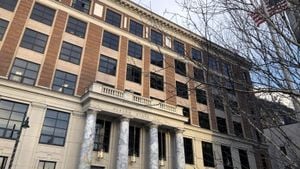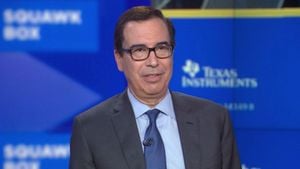Former President Donald Trump is striving to reclaim influence over Federal Reserve policies, ringing alarm bells among economists and policymakers. His assertion last week at a Mar-a-Lago press conference—stressing the president should "have at least a say" on interest rate decisions—emphasizes his belief he possesses superior economic instincts compared to Federal Reserve officials.
This idea threatens to erode the long-established principle of Fed independence, which many view as foundational to effective monetary policy management. Similarly, Trump’s running mate, Ohio Senator J.D. Vance, supports this shift, contending such financial decisions should fundamentally be open to political influence.
Critics, including prominent economists from diverse political backgrounds, vehemently oppose Trump’s proposals. They argue if presidents are allowed to dictate interest rates, it could lead to dangerous economic outcomes tied to election cycles.
Former Cato Institute economist George Selgin asserted, "It's absolutely a bad idea," reminding us of the negative impacts of presidential interference seen during the 1970s and 1980s. Mark Zandi, chief economist at Moody's Analytics, also warns, "Allowing the president to help set monetary policy would eventually wreck the U.S. economy."
This growing rhetoric from Trump surfaces at a time when the Federal Reserve is dealing with elevated interest rates—the highest they've been for over two decades. Current policies aim to lower inflation but risk pushing the economy toward recession, and any shift toward political involvement could jeopardize this balance.
Vice President Kamala Harris firmly rejected this proposed control, reinforcing the importance of Fed independence to reporters during her campaign. "I would never interfere in the decisions the Fed makes," she stated, underscoring the Fed's dual mandate aimed at controlling inflation and maximizing employment.
The Fed’s decisions largely rest on economic indicators, keeping them insulated from political pressures. A change to lessen this independence could invite short-term thinking, prioritizing immediate economic growth over long-term stability.
The historical context casts doubt on such political oversight. For example, Richard Nixon's administration pushed for reduced interest rates prior to the 1972 elections, contributing to inflation's uncontrollable spiral seen years later.
Historically, high inflation rates had devastating effects on the economy, peaking at 13.5% in 1980. Paul Volcker, as Fed chair, blessed with independence, raised rates dramatically to combat inflation, successfully curbing price increases by the end of his tenure.
Leaders like Volcker have championed the idea of apolitical monetary policy, which serves the public's interests without pandering to political whims. Economists today respect this model, as it allows the economy room to breathe without the weight of election-driven manipulation.
Meanwhile, Trump's previous governance reflects his relationship with the Fed, showing frustration over his inability to influence interest rates during his tenure. When economic indicators were unfavorable, he voiced his discontent with Fed Chair Jerome Powell, whom he appointed but later criticized for maintaining higher rates.
The Fed operates based on the fundamental goal of economic stability, whereby removing political leverage is seen as imperative. Powell has maintained, "We never use our tools to support or oppose a political party," reinforcing the commitment to remain nonpartisan.
Despite the Fed's historic autonomy, the emerging reality under Trump's potential influence leads to widespread apprehension. Economists like Ryan Chahrour suggest any shift toward political control would likely induce bias toward low rates, fostering inflation rather than sustainable growth.
If Trump fulfills his vision for increased influence, it could usher the nation back to the politically charged economic climate of the past. This scenario raises concerns about the motivation behind such changes, particularly during election cycles where politicians typically favor immediate economic gains.
Such discussions compel voters to question the long-term sustainability of economic strategies when led by transient political interests. The collective apprehension among economists painted against historical lessons serves to remind all involved: economic policy should ideally transcend politics.
With Trump's campaign focused on reclaiming unique ties to the Fed, the polarizing discourse surrounding this topic continues to evolve. What remains clear is the importance of Federal Reserve independence and the potential fallout should this principle be compromised.
Economists are on watch as the proposed shifts warrant vigilance; they could have broad ramifications for everyday life, influencing everything from mortgage rates to broader economic outlooks. The respects and checks surrounding financial independence are critical, especially as policymakers grapple with the reality of inflation and employment figures.



